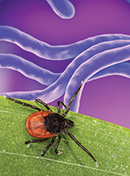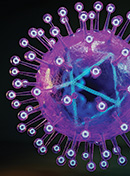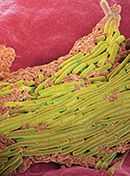|
NEW! Follow us on
 
Advertisement

|
 |
| Editor's Notebook |
Credit Where Credit's Due
The pharmaceutical industry receives much unfavorable publicity, but its successes should be acknowledged, too. |
 |
| Counseling Pearls |
 Lyme Disease: The Pharmacist's Role in Treatment and Prevention Lyme Disease: The Pharmacist's Role in Treatment and Prevention
The pharmacist can assist in early identification of the disease, antimicrobial selection and dosing, and monitoring of response. When Lyme symptoms are identified early, there is a high cure rate with antimicrobial treatment. |
 Prevention and Management of Genital Herpes Prevention and Management of Genital Herpes
Many people do not have symptoms, which makes it difficult to control the spread of disease. Treatment improves symptom duration and quality of life, but does not cure genital herpes. |
| |
| It's the Law |
Dispensing Cannabis
In several states, licensed pharmacists are now allowed to dispense medical marijuana. |
| |
| Clinical Corner |
 Management of Invasive Aspergillosis Management of Invasive Aspergillosis
This rare fungal infection, which most commonly develops in immunocompromised patients, is a major cause of morbidity and mortality. Because the lungs are the most frequent site of infection, symptoms and clinical manifestations are typically pulmonary. |
 Fecal Microbiota Transplantation: Use in the Treatment of Recurrent Clostridium difficile Fecal Microbiota Transplantation: Use in the Treatment of Recurrent Clostridium difficile
Cases of recurrent C difficile infection are increasing in both number and severity. This procedure is an alternative for patients whose infection is refractory to anti-infective therapy. |
| |
| TrendWatch |
Hepatitis Incidence and Prevalence in the Community
Hepatitis A, B, and C incidence dropped in the 1990s, followed by an upswing in recent years. |
| |
| Educational Spotlight |
Managing Chronic Pain Syndromes
Diabetic peripheral neuropathy, HIV/AIDs neuropathy, and postherpetic neuralgia adversely affect a patient's quality of life. |
Staging and Management of Heart Failure
Guideline-directed medication therapy, education, and lifestyle modifications are essential. |
Obstructive Sleep Apnea and Its Health-Related Complications
Untreated sleep apnea may be associated with cardiovascular and neurologic comorbidities. |
| |
|
 |
| Newswire |
 |
Metformin Lowers Risk
of Heart Disease
Death Better Than
Sulfonylureas
Baltimore, MD—
A recent analysis of 204 U.S. and international studies involving >1.4 million subjects suggests that metformin reduces the relative risk of death from heart disease by 30% to 40% compared with sulfonylureas. The meta-analysis examined drug effects and side effects such as glucose control in addition to cardiovascular disease and assessed antidiabetic drugs' performance alone and in combination. "Metformin looks like a clear winner," stated lead author Nisa Maruthur, MD, MHS. "This is likely the biggest bit of evidence to guide treatment of type 2 diabetes for the next two or three years." The last meta-analysis was published in 2011, before the arrival of several new diabetes drugs and the publication of >100 new studies comparing the effectiveness of blood sugar-lowering drugs. |
 |
Low Risk of Complications in AF Patients on Well-Managed Warfarin
Umea, Sweden—
In a study published by JAMA Cardiology, Umea University researchers discovered that patients with atrial fibrillation (AF) on well-managed warfarin therapy are at low risk for complications such as intracranial bleeding and all-cause mortality. Registry data on nearly 40,500 patients who started warfarin therapy for nonvalvular AF and were monitored until treatment cessation, death, or end of study were used for analysis. The annual incidence of intracranial bleeding was 0.44%, and that for all-cause mortality was 2.19%; patients also taking aspirin had annual rates of 3.07% for major bleeding and 4.9% for thromboembolism. "Well-managed warfarin treatment is a valid alternative in patients with AF who require anticoagulant treatments, with relatively low complication rates and low all-cause mortality," noted researchers. |
 |
Low-Dose Aspirin Could Increase Cancer Survival
Cardiff, Wales—
New research from Cardiff University School of Medicine suggests that patients receiving treatment for certain types of cancer could increase their chance of survival by approximately 20% and help stop the cancer from spreading by taking a low dose of aspirin. In a systematic literature review (mean study follow-up length >5 years), a research team found significant reductions in mortality and cancer spread in patients who took low-dose aspirin in addition to their cancer treatment. All available data from five randomized trials and 42 observational studies of breast, prostate, and colorectal cancers were examined. In light of aspirin's potential for intestinal bleeding, the team also specifically researched all data on bleeding and found no reports of serious or life-threatening bleeding in any study. |
 |
|